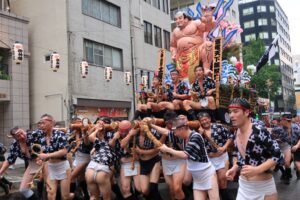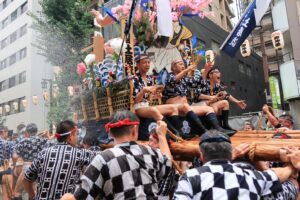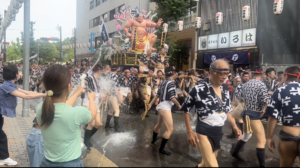This year is finally here… Hakata Gion Yamakasa will be held in 2023!

It is approaching again this year! A summer tradition『Hakata Gion Yamakasa』、commonly known as『Yamakasa』。
Yamakasa is one of the three major festivals in Fukuoka with a tradition of over 760 years,
and is registered as a national Important Intangible Folk Cultural Property and even a UNESCO Intangible Cultural Heritage!
There are various theories about the origin of Yamakasa, but the most popular theory dates back to the Kamakura Era (1185-1333).
It is said that the origin of Yamakasa dates back to 1241, when Shouichi Kokushi, founder of Jotenji Temple in front of present-day Hakata Station,
sprinkled prayer water on top of the altar carried by his disciples to drive away plague and disease.
Here is a brief history of our 760-year history.
■ History of Yamakasa
1587 (Azuchi-Momoyama Era)
After Toyotomi Hideyoshi achieved the unification of Kyushu through his war of conquest, he divided the burnt-out city of Hakata into several sections and formed a conglomerate called 「Nagare」 to rebuild the city.
This becomes the 「Nagare」 the organization for each region that operates the Yamakasa.
1687 (Edo Era)
It was in this year that the custom of parading the decorated Yamakasa in each town, competing in the splendor of the decoration, changed to the current 「Oiyamakasa」.
The competition between the two streams began when the Doi Nagare was overtaken by the Ishido Nagare (now the Ebisu Nagare)
while the Doi Nagare was taking a lunch break.
This competition was well received by the spectators, and this was the beginning of the current Oiyamakasa festival.
1872~1898 (Meiji Era)
During the Meiji Era (1868-1912), an era of upheaval due to the influx of Western culture,
a ban was imposed not only on Yamakasa, but also on Hakata Matsubayashi, one of the three major festivals in Fukuoka, on the grounds that it was not in keeping with civilization and enlightenment.
Even after Yamakasa resumed after being banned,
there was controversy over the barbaric appearance of the shimekomi-only participants, and they began to wear the current mizu-happi coats
In the Meiji era (1868~1912), Yamakasa was the tallest Yamakasa in history, reaching 16 meters, which caused many accidents that cut electric wires,
so it was divided into two types of Yamakasa: the “decorative Yamakasa” that remained 10 to 15 meters high to be displayed for dedication, and the “Kaki-yama” about 3 meters high that actually ran through town, which is the current form.
1945~1970 (Showa Era)
In 1945, the event is canceled due to the air raid on Fukuoka.
After the war, the 「Hakata Gion Yamakasa Promotional Association」 was established and group 「Yamamise」 was held, riding into areas outside of Hakata.
In 1970, 「Children’s Yamakasa」 in which elementary school students can participate, was started, making Yamakasa a festival loved by even more people.
Yamakasa is a festival for men in which women are prohibited, but girls can participate in this children’s festival.
2016 (Heisei Era)
The registration of Hakata Gion Yamakasa as a UNESCO Intangible Cultural Heritage has been granted.
Due to the coronavirus, the 2020 and 2021 editions of the festival were cancelled for the second year in a
This year, 2023, the coronavirus has been declared over, and the city of Fukuoka is more active than usual.
You can watch the Yamakasa festival right in front of WeBase Hakata, so let’s enjoy the excitement of this year’s festival together!✨



Here is a scene from last year’s Yamakasa💦
■ Schedule of Hakata Gion Yamakasa
Yamakasa schedule can be found on the 「Hakata Gion Yamakasa Official Website」below.
https://www.hakatayamakasa.com/152290.html
■WeBase Hakata Official website
Many fun events await you in July, especially the Hakata Gion Yamakasa Festival!♪
Here at WeBase Hakata, we are always lively with guests from all over the world and staff of various nationaliti🌍
Please come and visit us to create fun summer memories😊
➡Click here for reservations at WeBase Hakata
Event information is being sent out.☟
■Instagram @webasehakata
■Twitter @WeBase3







